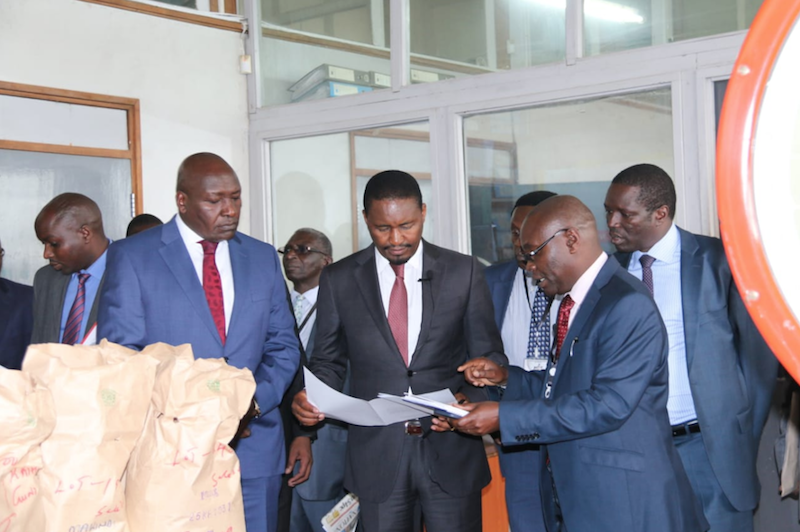
Launch of the Kenya Coffee Platform
The Kenya Coffee Platform was launched on 31 July 2018 through joint funding from the Dutch and German governments to revamp coffee productivity in Kenya. Speaking during the official launch of the platform, Mr Karugu Macharia, Managing Director of Solidaridad East & Central Africa, who also serves as the Chair of the Platform’s steering committee, decried the massive 60% decline in coffee productivity.
Many factors have contributed to the decline of the Kenyan coffee industry. This includes the high cost of farm inputs, coffee price volatility, aging farmers, obsolete processing technology, erratic weather patterns, low yields and poor returns, and poor governance in coffee cooperatives. Furthermore, many farmers have abandoned coffee farming for more lucrative business ventures such as horticulture, dairy farming and real estate.This has reduced the areas under coffee farming in Kenya.
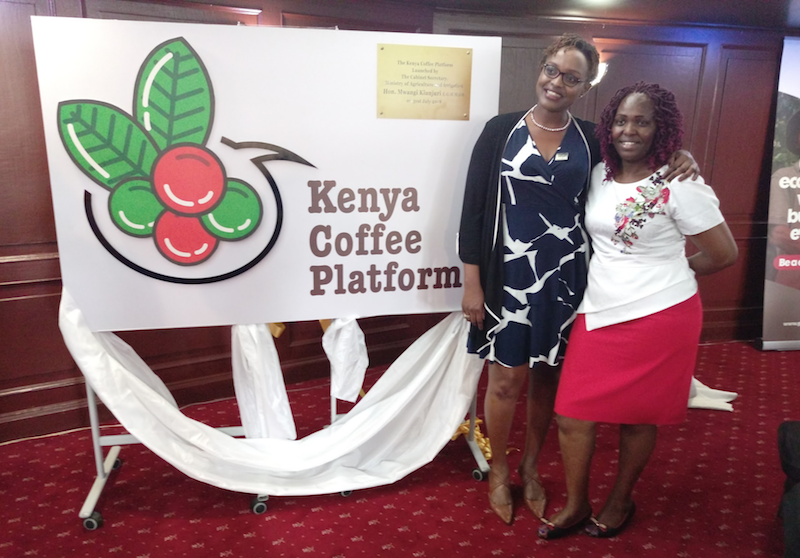
In his address, Karugu explained that the Coffee Platform is established to encourage joint and harmonized stakeholder engagement. The aim is to turn around the fortunes of the coffee industry to set it up on a profitable trajectory through increased production in volume and quality. Karugu acknowledged the great support and goodwill accorded by the Government of Kenya, the Dutch and German embassies, and other development partners towards the establishment of the Coffee Platform.
Mixed Fortunes for Globally Acclaimed Kenyan Coffee
During the launch, the German Deputy Ambassador to Kenya underlined the high demand for Kenyan coffee. Globally, the commodity is an indispensable ingredient consumed at a rate of 160 liters per person annually. In Germany, coffee consumption is higher than that of mineral water, soft drinks, and beer. Whatsmore, Kenya is the largest exporter of coffee to Germany, with 22% of Kenyan coffee being absorbed by the German market.
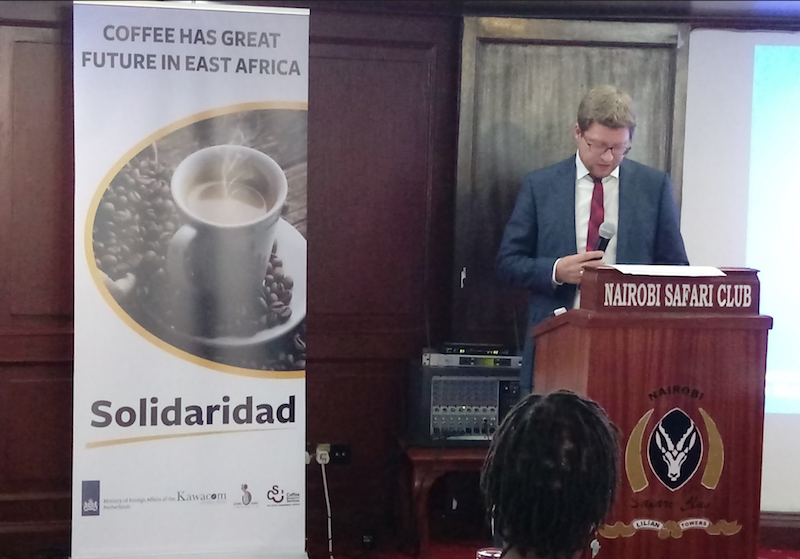 Pictured: German Deputy Ambassador to Kenya, Marius Rauh
Pictured: German Deputy Ambassador to Kenya, Marius Rauh
Despite high demand for Kenyan coffee, and the price premium it fetches on the international markets, approximately 700,000 smallholder coffee farmers are yet to benefit. Agriculture is the focus of the German government’s development cooperation with Kenya. The Ambassador pledged Germany’s continued support for the Coffee Platform in the establishment of the national sustainability coffee curriculum, Training of Trainers, and continuous improvement of the strategy for the Kenyan coffee sector.
Stakeholders were also referred to at the launch. Hon. Mary Nzomo, Chair of the Agriculture County Executive Committee in Kenya, suggested that the existence of brokers and middlemen in the coffee sector, and lack of regulation and guidelines to govern the growth of the coffee industry, are the root causes of impoverishment of farmers.
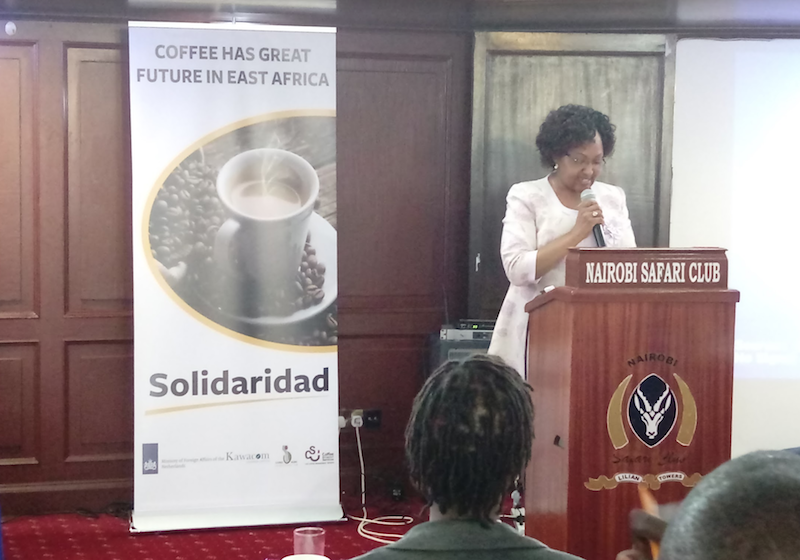 Pictured: Hon. Mary Nzomo
Pictured: Hon. Mary Nzomo
Lack of adequate information on coffee markets leaves farmers vulnerable. Nzomo noted that most discussions on agricultural interventions are addressed at county government level. However, important issues touching on policy, capacity building, and promoting trade are still within the national government’s domain. She urged the national government to adopt a farmer-centric approach to support coffee farmers access domestic and international markets, and to institute requisite legal frameworks to guide growth of the coffee industry.
An increase in coffee productivity is contingent on good rural infrastructure, well-functioning domestic markets, appropriate institutions, and access to appropriate technology. Since the administrative decentralization of Kenya, the county governments have initiated 86 value addition projects, 10 new markets, and created 32 market linkages in support of the coffee value chain.
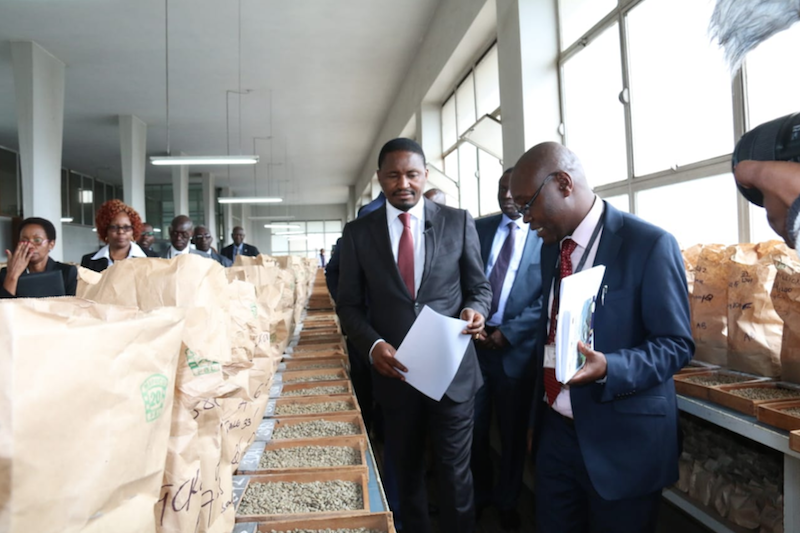
The Dutch Government’s Commitment to Inclusivity
One of many good points brought forward by the Head of Trade & Development Cooperation at the Dutch Embassy, Ms Matine Van Hoogstraten, was that coffee is an important income earner. In fact one that has been offering high beverage gross commodity price to producers compared to tea, milk, and maize. She suggested this trend demonstrates the great potential inherent in the Kenyan coffee sector for improving the livelihoods of its value chain actors as well as its great potential in terms of increased youth employment.
The Dutch Government’s support for the Kenyan Coffee sector is mainly directed towards the development of policies and programmes that ensure inclusivity of stakeholders, especially women and youth. A healthy balance between the role of the private and public sectors within the coffee sector is needed. Where the private sector has a key role in creating a vibrant and competitive coffee industry, the public sector should facilitate an environment for progressive growth of the coffee sector to achieve wealth creation in a more sustainable manner.
Government Efforts in Revamping the Coffee Sector
As outlined by Hon. Mwangi Kiunjuri, Cabinet Secretary for Agriculture, Fisheries, Livestock & Irrigation, coffee productivity has declined drastically, from 128,000 to 40,000 metric tonnes. Kiunjuri reaffirmed the government’s commitment to revamp the coffee sector. This will be done through research and innovation, provision of extension and advisory services, infrastructure development, establishment of farm input schemes, availing affordable financial services, embracing partnerships, and creation of local and international market linkages. Kiunjuri was optimistic that through these concerted efforts, Kenya’s coffee productivity would rise to 100,000 metric tonnes by the year 2022.
The Kenyan Government will soon roll out a program that will provide disease resistant coffee seedling varieties. This will go to farmers across the country for a period of three years in a bid to boost coffee productivity. Kiunjuri suggested that farmers will also be benefitting from subsidized farm inputs and soil analysis services. Access to vital information on best practices in coffee farming and markets will add on to these benefits.
The Kenya Coffee Platform is an all-inclusive multi-stakeholder forum that will articulate the competitive issues affecting the coffee sector. It will bring sanity to the coffee industry through implementation of industry best practices that result in increased profitability for the producers.
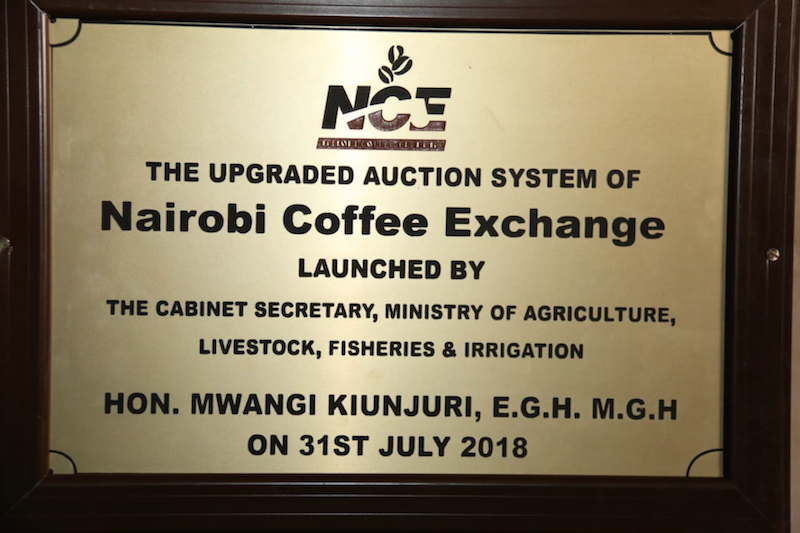
Following the launch of the automated Nairobi Coffee Exchange on 31 July 2018, coffee farmers are set to follow the sale of their produce in real-time. Kinjuri expects that this will bring about transparency on how coffee is auctioned, demystifying the coffee auction process.
Coffee at the Heart of Kenya’s History & Economic Developme
nt
Coffee was introduced in Kenya in 1893, and has since been cultivated for over a century. The commodity is intertwined with the historic and economic development of the country : from the early 1970s when fast economic growth was experienced during the ‘coffee boom’, to the 1990s when low economic growth was felt due to low coffee prices and instability in the sector.
By ensuring food and nutrition security, the commodity supports over five million Kenyan livelihoods both directly and indirectly.. Nationally, the coffee is cultivated on about 114,500 hectares with an annual production of 43,000 metric tonnes. The Kenyan coffee sector supports about 700,000 small scale farmers, and over 4,000 medium and large scale estates. The industry provides 200,000 permanent jobs and 200,000 temporary and casual jobs This accounts for an estimated 30% of labor in the agricultural sector. In total, coffee constitutes 8% of the total agricultural exports, accounting for 1% of Kenya’s national GDP.
The Kenyan Coffee Platform is supported by the governments of The Netherlands and Germany who are working alongside Solidaridad, The Global Coffee Platform, Africa Fine Coffee Association, and Rainforest Alliance/UTZ.
Learn more about Solidaridad’s coffee programme here.
